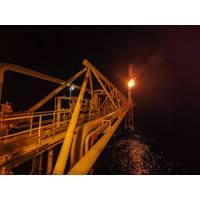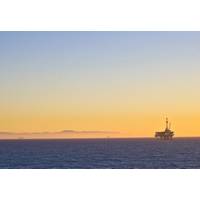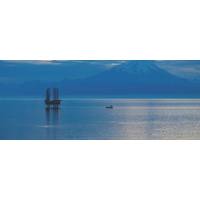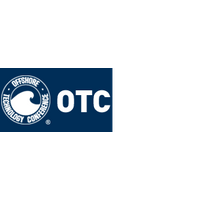ConocoPhillips CEO Says Surprised by Quick Rebound in Oil Prices

ConocoPhillips Chief Executive Officer Ryan Lance on Wednesday expressed surprise at the quick rebound in U.S. oil prices that slipped into the negative territory in April and said he expects prices to remain volatile in the near term.Oil is now trading at near $40 per barrel, almost double of $20 it averaged in April, the same month prices had briefly slumped to minus $38 per barrel due to low demand as countries halted travel to curb the spread of the new coronavirus, while top producers agreed to pump full bore."We were surprised it came back this strong this quickly…
When Oil Became Waste

A week of turmoil for crude, and more pain to comeThe magnitude of how damaged the energy industry is came into full view on April 20 when the benchmark price of U.S. oil futures, which had never dropped below $10 a barrel in its nearly 40-year history, plunged to a previously unthinkable minus $38 a barrel.In just a few months, the coronavirus pandemic has destroyed so much fuel demand as billions of people curtail travel that it has done what financial crashes, recessions and wars had failed…
California to Ban Crude from Trump Offshore Drilling Plan

California will block the transport of petroleum from new offshore oil rigs through its state, officials told Reuters, a move meant to hobble the Trump administration’s effort to vastly expand drilling in U.S. federal waters. California's threat to deny pipeline permits for transporting oil from new leases off the Pacific Coast is the latest step by states trying to halt the biggest proposed expansion in decades of federal oil and gas leasing. Officials in Florida, North and South Carolina…
As US Opens Up Offshore Waters, Eastern GoM Beckons
President Donald Trump's administration has proposed opening up nearly all of America's offshore waters to oil and gas drilling, but the industry says it is mainly interested in one part of it, now cordoned off by the Pentagon: the eastern Gulf of Mexico. The industry's focus on an area located near a sprawling network of existing platforms, pipes and ports could ease the path to new reserves, and assuage the drilling opponents near other places offered under the Interior Department's proposed drilling plan issued last week, like California's Pacific, the Atlantic and Arctic.
Trump Aims to Open Nearly All US Offshore to Oil Drilling

The Trump administration on Thursday proposed opening nearly all U.S. offshore waters to oil and gas drilling, a move aimed at boosting domestic energy production that sparked protests from coastal states, environmentalists and the tourism industry. The effort to open previously off-limits acreage in the Atlantic, Arctic and Pacific oceans comes less than eight years after BP Plc's Deepwater Horizon oil spill in the Gulf of Mexico - the largest in American history. The disaster caused billions of dollars in economic damage and led former President Barack Obama's to increase regulation of the industry.
Plan to Support Coal, Nuclear Divides U.S. Energy Industry
U.S. industries that rarely agree - gas drillers and renewable energy producers - urged a federal agency on Monday to dump a government directive to prop up ageing nuclear and coal plants, saying the electricity grid was already reliable. The split in the energy industry showed that a Trump administration push to make the country energy "dominant" by boosting output from every part of the sector may face hurdles. A group of 20 organizations including the Independent Petroleum Association…
US to Speed Approval for O&G Exploration on Federal Land
U.S. Interior Secretary Ryan Zinke on Thursday signed an order to hold more lease sales and to speed up approving permits to explore for oil and gas on federal land, a process he said got bogged down under former President Barack Obama. The order is the latest move by the administration of President Donald Trump to make it easier to drill and mine on federal land, which Zinke said is a source of income for the government. The Interior Department's Bureau of Land Management is supposed to…
US Completes Rule to Curb Methane from Federal O&G Production
The U.S. Interior Department finalized rules on Tuesday aimed at preventing methane leaks from oil and gas production on federal and tribal lands, one of the last major Obama administration rules aimed at fighting climate change. Interior's Bureau of Land Management (BLM) said on Tuesday the rule, updating 30-year-old regulations that govern flaring, venting and natural gas leaks from oil and gas production, could avoid wasting up to 41 billion cubic feet (BCF) of natural gas per year. "This rule to prevent waste of our nation's natural gas supplies is good government…
Trade Groups Seek Information on New US Decommissioning Rules
Seeking information related to the recent changes to the financial assurances and bonding required of offshore oil and gas producers, four oil and gas industry trade groups today submitted Freedom of Information Act (FOIA) requests to both the Bureau of Ocean Energy Management (BOEM) and the Department of the Interior (DOI). The four industry trade groups, the National Ocean Industries Association (NOIA), the Independent Petroleum Association of America (IPAA), the Louisiana Mid-Continent Oil and Gas Association (LMOGA)…
New Campaign Pushes for Arctic Energy

A coalition of groups supportive of responsible resource development in and off the coast of Alaska today unveiled a new broadcast, print and digital advertising campaign calling on the Obama administration to keep intact the Arctic leasing areas currently contained in the Interior Department’s draft proposed plan. The draft program, revealed in March, allows for the possibility of lease sales to be held for federally controlled tracts in the Beaufort (2020) and Chukchi (2022) seas. But activist groups continue to wage an aggressive campaign to have those areas removed from the final schedule.
Fracking Stakeholders Win Key Legal Round
A federal judge in Wyoming granted a preliminary injunction on Wednesday against new regulations for hydraulic fracturing on public lands, handing a victory to oil and gas producers who had vehemently opposed the rules. U.S. District Judge Scott Skavdahl had put the regulations on hold in June as he weighed a request from energy industry groups and four states to stop the rules from being implemented until their lawsuit against the new standards was resolved. The rules issued by the Interior Department would require companies to provide data on chemicals used in hydraulic fracturing…
US Fracking Rules to Face Early Legal Test
Energy industry groups and states that oppose new U.S. rules for hydraulic fracturing on public lands are headed to court this month to try to block the regulations a day before they are to take effect. Foes of the regulations will go before a federal judge on June 23 to seek a preliminary injunction. The Interior Department rules, slated to take effect on June 24, would require companies to provide data on chemicals used in hydraulic fracturing, or fracking, and to take steps to prevent leakage from oil and gas wells on federally owned land.
EPA: Fracking Not a 'Widespread Risk' to Drinking Water
Fracking for shale oil and gas has not led to widespread pollution of drinking water, a U.S. potentially cause health risks. The study, requested by Congress and five years in the making, said fracking could contaminate drinking water under certain conditions, such as when fluids used in the process leaked into the water table. The EPA said it found isolated cases of water contamination, but "the number of identified cases ... was small compared to the number of hydraulically fractured wells.
Oil Groups Ask Court to Temporarily Block US Fracking Rules
Two oil and gas groups have asked a federal court to block the implementation new U.S. rules for hydraulic fracturing on public lands until their lawsuit challenging the regulations is resolved. The Independent Petroleum Association Of America (IPAA) and the Western Energy Alliance filed a motion on Friday for a preliminary injunction to prevent the Interior Department's Bureau of Land Management from enforcing the regulations, arguing the standards will cause their members irreparable harm.
U.S. Set to for More Accurate Oil Production Data
Figures on U.S. oil production are subject to much more uncertainty than the numbers for oil stocks, refinery throughput and imports because the Energy Information Administration (EIA) has to rely on state-level data rather than its own surveys. That could be about to change, however, because the EIA has received approval from the White House to launch its own mandatory monthly survey of oil and condensate production. The first of the new survey forms have gone out and respondents are beginning to submit data.
Oil & Gas Industry Groups Sue over U.S. Fracking Rules
The oil and gas industry moved quickly on Friday to challenge new U.S. regulations for hydraulic fracturing on public lands, minutes after the Obama administration issued the rules. In what could be the start of a broad industry assault on the rules, the Independent Petroleum Association of America (IPAA) and Western Energy Alliance sued the U.S. Interior Department. Other industry groups and companies are expected to follow suit. The new regulations would require companies to provide data on the chemicals used in hydraulic fracturing…
Charity Selected for 2015 OTC Dinner

The Offshore Technology Conference (OTC) announces the 2015 beneficiary of the Annual OTC Dinner—the Independent Petroleum Association of America (IPAA) and the Petroleum Equipment & Services Association (PESA) Energy Education Center for the benefit of the Energy Institute High School. OTC will host the fifth Annual OTC Dinner on Sunday, May 3, 2015 at NRG Stadium in Houston. The event recognizes industry achievements, raises funds for a worthy cause, and provides an excellent opportunity for industry leaders to network with colleagues from around the world.
BSEE Addresses Near Miss Reporting

Bureau of Safety and Environmental Enforcement (BSEE) Associate Director Allyson Anderson addressed the Independent Petroleum Association of America’s (IPAA) Offshore Committee last week during their meeting in Houston. In her address, Anderson highlighted the bureau's work with the Bureau of Transportation Statistics (BTS) on the Near-Miss Reporting System and the critical role that industry will play in the success of the program. Anderson said the bureau needs offshore workers to feel empowered to voluntarily report near-misses and be active participants in creating a robust safety culture.
Whiting Petroleum: Sufficient Sand for Fracking
Whiting Petroleum Corp is not concerned about access to large quantities of sand critical to the hydraulic fracturing process and the expansion of its operations in North Dakota and Colorado, Chief Executive Jim Volker said on Monday. For each well, the U.S. energy industry uses more than 3 million pounds (1,400 metric tons) of sand, known within the industry as proppant, to mix with water and chemicals at high pressures and hold open cracks in rock so oil and natural gas can escape. Concern…
Whiting Petroleum Says it Can Get Sufficient Sand for Fracking
Whiting Petroleum Corp is not concerned about access to large quantities of sand critical to the hydraulic fracturing process and the expansion of its operations in North Dakota and Colorado, Chief Executive Jim Volker said on Monday. For each well, the U.S. energy industry uses more than 3 million pounds (1,400 metric tons) of sand, known within the industry as proppant, to mix with water and chemicals at high pressures and hold open cracks in rock so oil and natural gas can escape. Concern…
